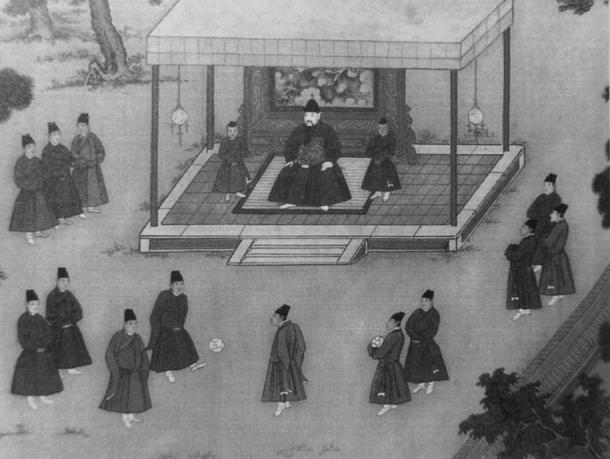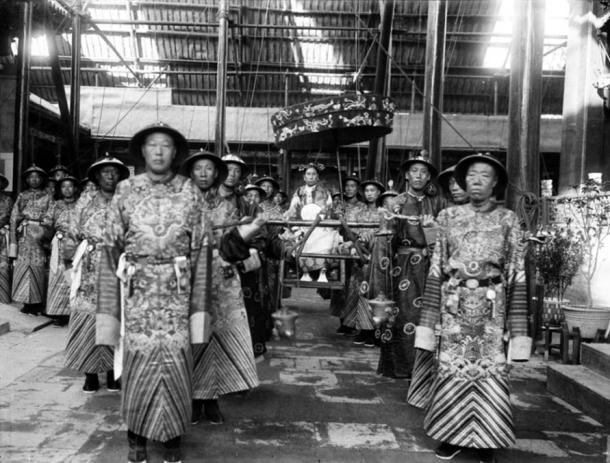The Inner Court of China’s Forbidden City was the emperor’s private realm, where no other men were allowed to linger for too long. Officials, military personnel, and even male relatives of the emperor were required to leave the Inner Court at night. The only men who were allowed to stay in the Inner Court were those who had been rendered sexually impotent through castration. These were the eunuchs of China.
The Reasons Behind Castration in Ancient China
While the Forbidden City was only built during the Ming Dynasty in the 15th century, the practice of castration and the use of eunuchs in China can be traced much further back. In ancient China (up until the Sui Dynasty), castration was one of the Five Punishments, a series for physical punishments meted out by the Chinese penal system.
Nevertheless, castration was also a means of getting a job in the Imperial service . Since the Han Dynasty, eunuchs ran the day to day affairs of the Imperial court. As their duties brought them in close contact with the emperor, eunuchs had the potential to exert a considerable amount of influence on the emperor as well as amass an immense amount of political power.
Since eunuchs were unable to have children of their own and pass down their power, they were not seriously considered a threat to the ruling dynasty. The powerful emperors of China would sometimes have thousands of concubines within the Forbidden City, with no risk that the women would become impregnated by anyone but themselves.

Thousands of Eunuchs served in the Forbidden City of China. Source: BigStockPhoto
The Immense Power of the Chinese Eunuch Zhao Gao
While eunuchs were dismissed as potential threats due to their inability to found their own dynasties, they were entirely capable of bringing down ruling dynasties. The immense power that some eunuchs wielded corrupted them, turning them into greedy, ruthless, and scheming individuals.
In Chinese dramas and films about the Imperial court, eunuchs are often cast as villainous characters. Many instances of evil eunuchs can be found in Chinese history. The fall of the Qin dynasty, for instance, may be attributed to the eunuch Zhao Gao.

Ming Dynasty Eunuchs. ( Public Domain )
According to the historical records, Zhao Gao belonged to the ruling family of the state of Zhao, one of the seven states during the Warring Period. When Zhao Gao’s parents committed a crime, they were punished, and his brothers were castrated. It is traditionally thought that the same punishment was inflicted onto Zhao Gao.
Zhao Gao came into the service of Qin Shi Huang as he was an expert in law and punishment. This allowed Zhao Gao to rise through the ranks and become one of the emperor’s closest advisors. Upon the death of Qin Shi Huang, Zhao Gao and the Prime Minister / Chancellor, Li Si, orchestrated a coup by engineering the death of the heir apparent, Fusu, as well as two of his supporters, Meng Tian and Meng Yi.
Subsequently, Qin Shi Huang’s youngest son, Huhai, was installed as a puppet emperor. Three years later, a rebellion broke out, and Zhao Gao forced Huhai to commit suicide, fearing that the emperor might hold him responsible for the uprising. Zhao Gao then installed Ziying (either Fusu’s son, or Fusu’s uncle) as the new emperor.

A group of eunuchs. Mural from the tomb of the prince Zhanghuai, 706, Qianling, Shaanxi. ( Public Domain )
Knowing that Zhao Gao would dispose of him once he was no longer of use, Ziying turned the tables on Zhao Gao, and succeeded in killing him. The uprising was not quelled, however, and Ziying surrendered to Liu Bang, who founded the Han Dynasty. Thus, it may be said that the actions of the eunuch Zhao Gao was responsible for the fall of the Qin dynasty just three years after the death of Qin Shi Huang .
Other Roles of the Ancient Chinese Eunuch
Despite the notorious reputation that the Chinese eunuchs acquired over the course of history, not all of them were villainous. Some even contributed greatly to Chinese culture. Paper, one of the Four Great Inventions, is said to have been invented during the Eastern Han dynasty by a eunuch named Cai Lun, for example.
Furthermore, Zheng He , who was a eunuch serving under the Ming emperor Yongle, commanded the emperor’s trading fleets on voyages to Southeast Asia, India, Arabia, Persia, and East Africa, thus connecting China with these parts of the world through trade.
Additionally, Chinese eunuchs are said to have made contributions to the court music of China. Eunuchs during the Ming dynasty were recorded as the first Chinese to play Western Classical music, while the emperor Qianlong of the Qing dynasty assembled a chamber orchestra consisting of eunuchs dressed in European suits and wigs.

Eunuchs from the Qing dynasty. ( Public Domain )
The end of the Qing dynasty in the early 20th century brought an end to the Chinese imperial system, and also the use of eunuchs. In 1924, the last 1500 eunuchs were banished from the Forbidden City. The last imperial eunuch, Sun Yaoting, died in December 1996, thus bringing an end to an ancient practice that spanned several millennia.
Top Image: Chinese court eunuch ( WC 24 /Adobe Stock) in the Forbidden City. ( Pixabay License )
By Wu Mingren
Related posts:
Views: 0
 RSS Feed
RSS Feed

















 August 5th, 2020
August 5th, 2020  Awake Goy
Awake Goy  Posted in
Posted in  Tags:
Tags: 
















